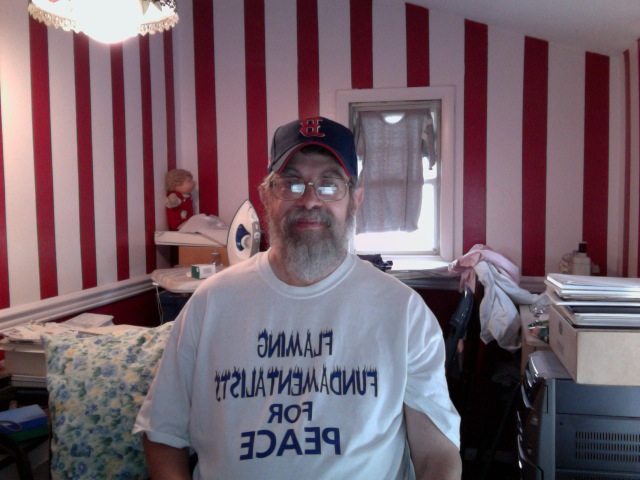May 16th’s event was a remembrance of the 60th anniversary of a historical Middle East development. The speakers served as a picture of America’s melting pot as they represented different ethnicities, religions, and occupations. The commemoration began with prayer. The speakers and the audience showed a deep reverence for “The Land.” Speakers talked about the need for all groups to live in peace.
Considering that Israel is the only “democracy” in the Middle East, one would think that this event was celebrating Israel’s 60th birthday, but that would be wrong. Rather, we were recognizing Al-Nakbah—the Palestinian catastrophe—outside of the UN (Al-Nakbah ). Al-Nakbah refers to the 700,000 Palestinians who left their homes either because of the fear of war or were driven out by Jewish fighters. But it was not just the refugees of 1948 who were remembered; all Palestinians who have suffered under Israel’s occupation were honored.
I had arrived early and by the time the program started, I looked a mess. The poncho I was wearing to protect myself from the rain was falling apart. When they were setting up for the event, I felt out of place just like I initially felt during an immigration rights march I attended a couple of years ago. That happens when most of the people you are with speak another language and are from another culture. But once the program started, I felt more at ease.
First there was a prayer service. Though I disagree with Muslims regarding who Jesus and Mohammed are, I wanted to quietly watch as they were led in prayer because Muslims deserve to be respected as equals. In contrast to the fear mongering rumors I have heard from anti-Muslim bigots, all I could sense from the prayer meeting was a seriousness and reverence that I do not often observe elsewhere.
Then there were the speeches. The first speaker was an Arab Muslim who cited the words of many people from different backgrounds. He appealed to a common sense understanding of fairness. Speakers such as the Green Party’s Presidential candidate Cynthia McKinney and Phylis Bennis talked about the sins of domination as seen in American imperialism. It is the desire to dominate that is at the heart of the Israeli-Palestinian conflict and is destroying both the humanity of the victimizer as well as the lives of the victims.
A Native American talked about his solidarity with dispossessed Palestinians. A Palestinian Christian spoke against Israel’s occupation and served as proof that Muslims are not the only targets of Israel’s occupation. A non-Zionist Jew spoke against Israel’s Zionist policies. One of the speakers talked about her experiences of working with Palestinian refugee children. A poet talked about the occupation and there was a hip-hop performer.
A most telling remark was made while a Palestinian speaker was talking about how anger is a part of being Palestinian. A nearby Green Party supporter commented that that anger would not play well in the general public. And yet, when one considers how the Palestinian people suffer, one would have to have lost all touch with reality to have no anger. For example, consider Gaza today. Gaza has little to no electricity and their sources for food and medicine have been shut down. In addition, the people of Gaza endure military strike after military strike.
Some of the statements made defended the way that Palestinians fight back. A very legitimate question, who is the terrorist? was asked. All too often, terrorism is associated solely with the tactics of one side. One only needs to access the B’Tselem website (B'Tselem ) to see all who are committing terrorism. Despite the support for Palestinian resistance, there were no statements that targeted Jews. In fact, one speaker emphasized solidarity with the victims of the Holocaust. A march through parts of NYC followed the speeches.
In contrast to the stereotypes employed by anti-Muslim bigots and fear mongers, the people who organized, participated in, or attended the event showed every indication of wanting both peace and justice. There was an openness and freedom to this event that many of us, by our own fault, do not associate with Muslims. But I should not have been surprised by that atmosphere because I have had an article printed in a Palestinian website that included criticisms of Arafat’s failure to curb terrorism (article on Sharon ). In addition, when one views websites like the Palestine Chronicle (The Palestine Chronicle ), one will see a variety of groups represented by the authors of the articles listed.
There are criticisms to be made, too. First, I heard no statements that denounced terrorist attacks on Israeli civilians. Attacks on civilians should be distinguished from attacks on soldiers because Palestinians have a legal right to resist the occupation. Also, the same criticism that Israeli academic Neve Gordon levels against Israel could also be applied to some of the attendees of this commemoration. In a recent article, Gordon criticizes Israelis for their inclination to “idolize the land” and that this contributes to the perpetual violence in the region (see article ).
Certainly the Palestinians merit a qualified support from everyone - qualified because no one should support attacks on civilians. But the support is deserved even if one does not have the same passion for “the land” as Palestinians do because there is a more important issue at hand. That issue is equality. Fairness and humanity demand that we work for everyone’s equality. Equality is the most basic recognition that the Israeli government denies the Palestinians. But for those who are not moved by the plight of others, there is a selfish reason for caring about the Palestinians. Our government will not forever protect our equality at home when it supports inequality abroad.





